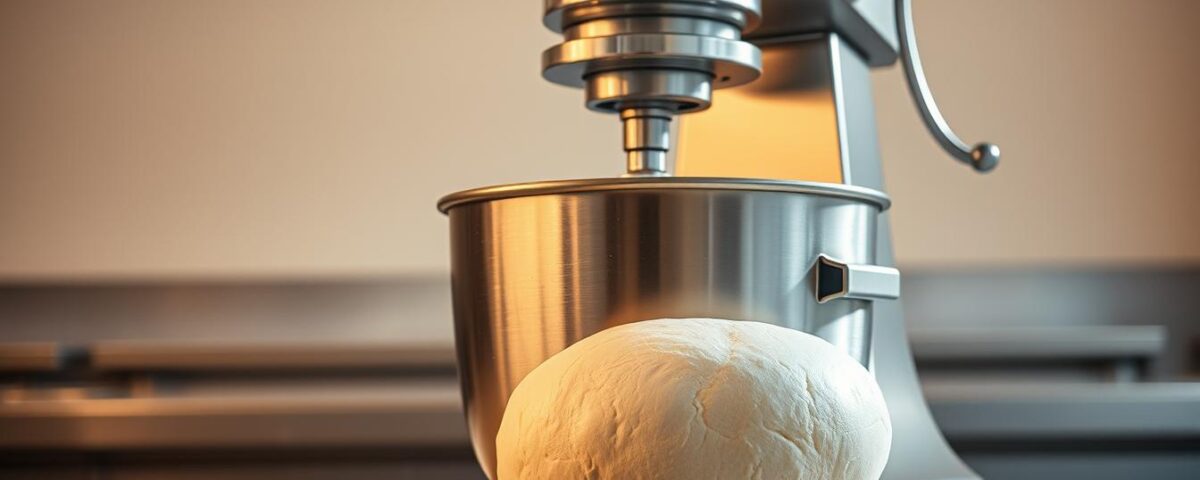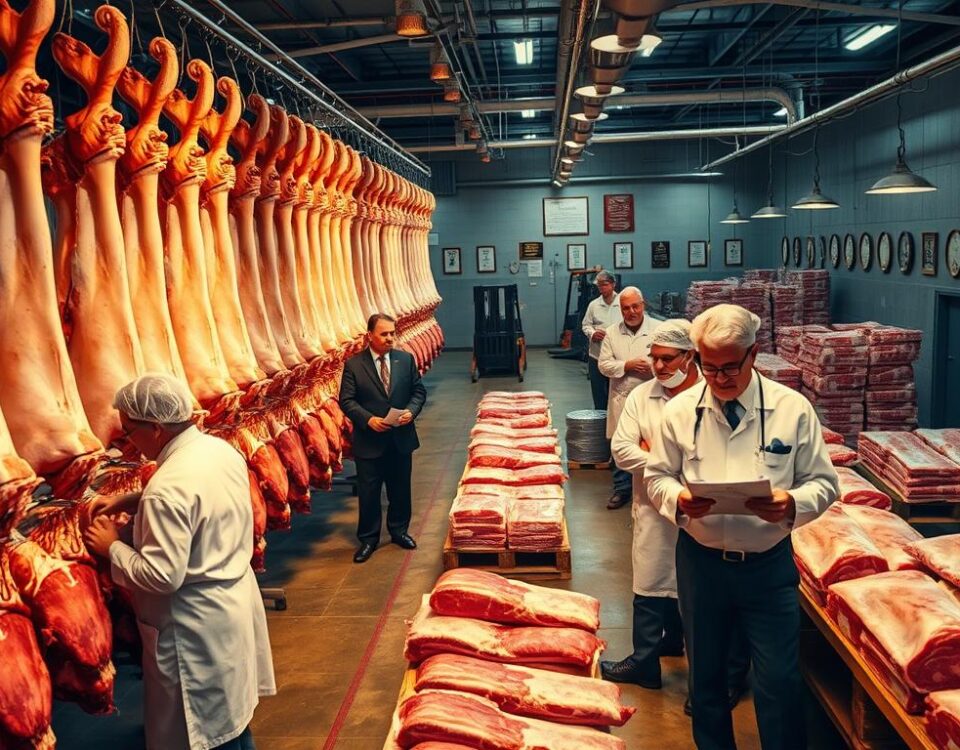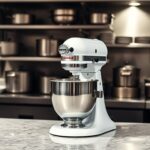
What to Know Before Using KitchenAid in a Restaurant
September 5, 2025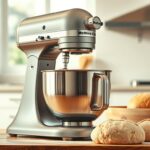
Best Dough Mixers for Pizza vs Bread: How to Choose
September 6, 2025As a baker, you’ve likely spent countless hours perfecting your dough recipe, but have you ever stopped to think about the equipment that’s helping you create your culinary masterpieces? For many bakeries and restaurants, the right mixer can make all the difference in the quality and consistency of their final products.
Did you know that the global commercial mixer market is projected to grow significantly in the coming years, driven by the increasing demand for high-quality baked goods? With so many options available, choosing the right mixer for your kitchen can be overwhelming, especially when it comes to deciding between a spiral and planetary mixer.
So, what’s the key to making the perfect dough? It all starts with understanding the differences between these two popular mixer types and determining which one is best suited to your specific needs.
Key Takeaways
- Understand the fundamental mechanics and purposes of commercial mixers
- Discover the distinct advantages of spiral and planetary mixers for different types of dough
- Learn how to choose the right mixer for your specific baking needs
- Find out how the right mixer can impact the quality and consistency of your final products
- Gain insights into the technical aspects of each mixer type
Understanding Planetary Mixers
I’ve found that planetary mixers are incredibly versatile, making them a valuable asset in any kitchen. These mixers are designed to handle a wide range of tasks, from mixing and kneading dough to whipping cream and beating eggs.
How Planetary Mixers Work
Planetary mixers operate through a unique mechanism where the mixing attachment rotates around the bowl, ensuring thorough and efficient mixing. This action, combined with the ability to change attachments, makes them highly adaptable to different recipes and ingredients. The mixer’s bowl remains stationary, while the attachment moves in a planetary motion, hence the name.
Versatility and Applications
The true strength of planetary mixers lies in their versatility. They can be used for a variety of tasks, including making dough for bread, cookies, and pizza, as well as preparing sauces, frostings, and mashed potatoes. With interchangeable attachments like dough hooks, flat beaters, and wire whips, these mixers can tackle nearly any mixing task. Many models also feature power hubs for additional attachments, expanding their capabilities to tasks like grinding meat or slicing vegetables.
| Attachment | Application |
|---|---|
| Dough Hook | Kneading dough for bread, pizza, and cookies |
| Flat Beater | Mixing batters and creaming ingredients |
| Wire Whip | Whipping cream and beating eggs |
Understanding Spiral Mixers
For bakeries focused on artisan bread production, understanding the mechanics and benefits of spiral mixers is crucial. These mixers are renowned for their ability to produce high-quality dough that is perfect for bakeries and pizzerias.
How Spiral Mixers Work
Spiral mixers operate with a unique mixing action that closely replicates traditional hand-kneading techniques. The spiral hook rotates within a stationary bowl, or in some models, the bowl rotates while the spiral hook remains stationary. This action creates a gentle yet effective mixing process.
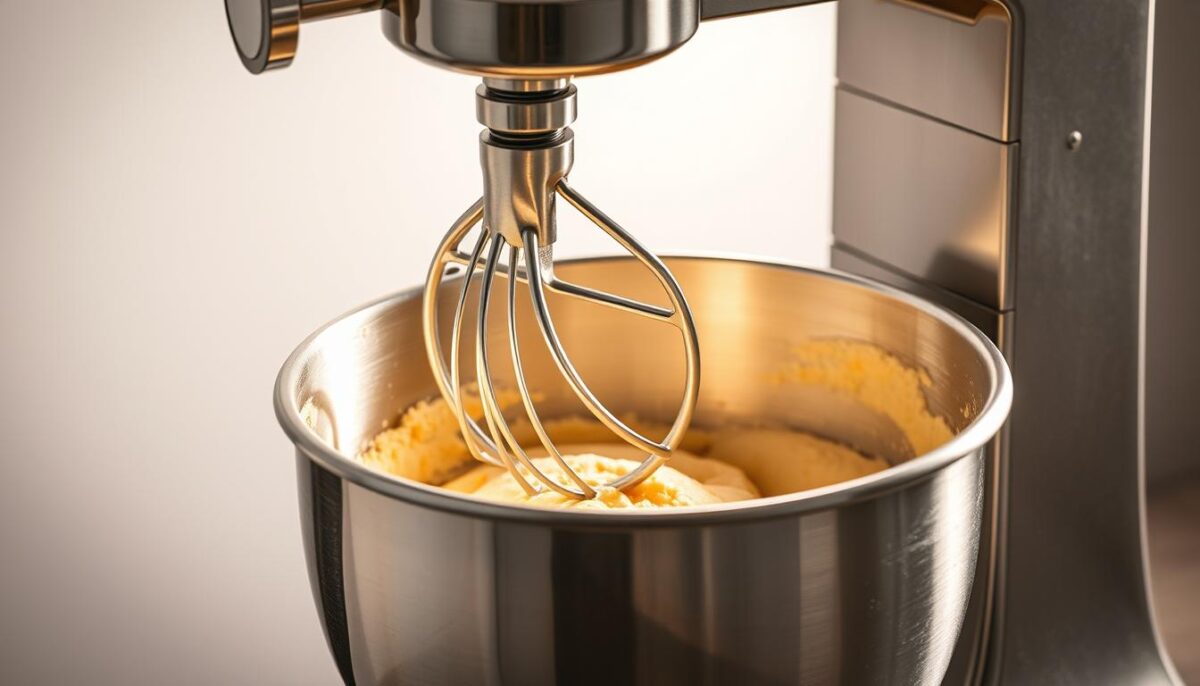
Specialized Dough Development
The design of spiral mixers allows for specialized dough development. They excel at developing gluten structure in bread dough, creating the perfect texture and elasticity needed for artisan bread products. The gentle mixing action introduces less oxygen into the dough, resulting in better flavor development and a more authentic artisanal product. Additionally, spiral mixers maintain lower dough temperatures during mixing, which is crucial for proper fermentation and optimal yeast activity.
Some key benefits of using spiral mixers include their ability to handle high-hydration doughs effectively and their consistent folding action, which ensures even distribution of ingredients throughout the dough mass.
Key Differences Between Spiral vs Planetary Mixers
As a seasoned baker, I’ve come to realize that the choice between spiral and planetary mixers depends on several critical differences. Understanding these differences is essential for commercial kitchens to make informed decisions that impact their production efficiency and product quality.
Dough Quality and Consistency
The quality and consistency of dough are paramount in bakeries. Spiral mixers are renowned for their ability to produce consistent dough quality due to their gentle mixing action, which doesn’t overwork the dough. In contrast, planetary mixers offer versatility in handling various types of dough and other mixtures, but may not always match the consistency achieved by spiral mixers.
“The right mixer can make all the difference in the quality of your dough,” says a renowned baker. “For high-volume bakeries, spiral mixers are often the preferred choice due to their efficiency and consistency.”
Temperature Control and Gluten Development
Temperature control is another critical aspect where spiral mixers excel, as they generate less friction heat compared to planetary mixers. This characteristic is crucial for gluten development, as excessive heat can damage the gluten structure, leading to inferior dough quality. Planetary mixers, while versatile, require more careful monitoring to prevent overheating.
Capacity and Commercial Applications
When it comes to capacity, spiral mixers typically handle larger dough batches, making them ideal for high-volume bakeries and pizzerias. Planetary mixers, on the other hand, are more suited for diverse commercial kitchens that need to produce a variety of items beyond just dough. The choice ultimately depends on the specific needs of the business, including space considerations and production volume.
For businesses focused on dough production, such as pizzerias, spiral mixers may offer better long-term value despite their higher initial cost. Conversely, restaurants with diverse menus may find planetary mixers more suitable due to their versatility in handling everything from dough to sauces.
Which Mixer Is Right for Your Needs?
When deciding between a spiral mixer and a planetary mixer, it’s crucial to consider your specific baking needs. If your primary focus is on producing high-quality bread, pizza dough, or other yeast-raised products in significant volume, a spiral mixer is likely the better choice.
On the other hand, if you need versatility to handle multiple food preparation tasks beyond dough, a planetary mixer is more suitable. Consider your production volume, available kitchen space, and budget when making your decision. For bakeries and pizzerias focused on dough products, a spiral mixer will likely yield better quality and consistency. In contrast, restaurant kitchens with diverse menus will benefit from the adaptability of a planetary mixer.
Ultimately, understanding your business needs and evaluating the strengths of each mixer type will guide you to the right choice. Today’s commercial mixer market also offers hybrid options that combine the best features of both mixer types, worth exploring for businesses with unique needs.
FAQ
What type of dough is best suited for a spiral mixer?
I find that spiral mixers are ideal for developing dense, heavy dough, such as those used in artisan bread and pizza production, due to their ability to handle high-capacity dough with ease.
Can a planetary mixer handle large quantities of dough?
While planetary mixers are versatile and can handle a variety of mixing tasks, they may not be the best option for very large quantities of dough. However, some models come with larger bowls and more powerful motors, making them suitable for bigger batches.
How do I choose between a spiral and a planetary mixer for my bakery or pizzeria?
When deciding between the two, consider the type of dough you produce most often, the volume of your production, and the specific features you need, such as temperature control and gluten development. I recommend assessing your business needs and testing different mixers to find the best fit.
Are there any mixers that combine the benefits of both spiral and planetary mixing actions?
Yes, some commercial mixers offer multiple mixing actions, including both spiral and planetary motions, providing the flexibility to handle a wide range of dough types and ingredients. These versatile mixers can be a great option for businesses with varied production needs.
What are some key considerations when selecting a mixer for bread and pizza dough production?
When choosing a mixer for bread and pizza dough, I consider factors such as dough quality, temperature control, and capacity. It’s also essential to think about the specific features that will benefit your production, such as a rotating bowl or specialized attachments.
Can a single mixer handle multiple types of dough and ingredients, such as cookies and sauces?
Many mixers, especially planetary models, come with interchangeable attachments that allow for a variety of mixing tasks, from whipping sauces to kneading dough for cookies. This versatility makes them a valuable asset in many commercial kitchens.
